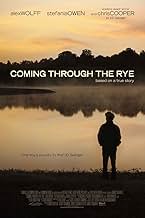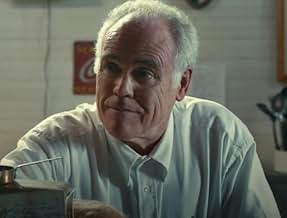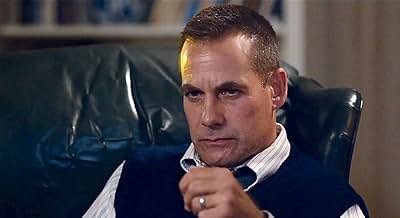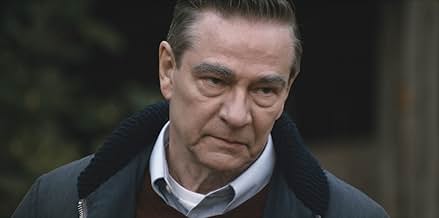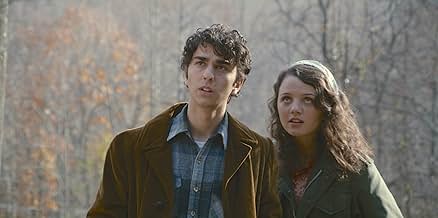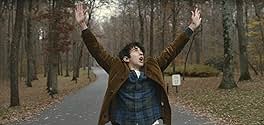AVALIAÇÃO DA IMDb
6,2/10
1,1 mil
SUA AVALIAÇÃO
Adicionar um enredo no seu idiomaIn 1969, the Holden Caulfield-obsessed Jamie Schwartz runs away from boarding school to find the reclusive author J.D. Salinger. Inspired by actual events, Jamie's search is a journey into t... Ler tudoIn 1969, the Holden Caulfield-obsessed Jamie Schwartz runs away from boarding school to find the reclusive author J.D. Salinger. Inspired by actual events, Jamie's search is a journey into the meaning of friendship, love and loss.In 1969, the Holden Caulfield-obsessed Jamie Schwartz runs away from boarding school to find the reclusive author J.D. Salinger. Inspired by actual events, Jamie's search is a journey into the meaning of friendship, love and loss.
- Direção
- Roteirista
- Artistas
- Prêmios
- 12 vitórias e 3 indicações no total
Stefania LaVie Owen
- Deedee
- (as Stefania Owen)
Melissa Lozoff
- Dot
- (as Melissa Ann Lozoff)
Robert C. Treveiler
- Dan
- (as Rob Trevelier)
Avaliações em destaque
I admit to being thrown off by the rave reviews here, because I found this movie utterly dull and not at all moving or evocative. To the degree it may have touched on the coming-of-age experience, it did so because of cliche scenes and plot lines recycled from every movie you have seen about young people. The writing suffers from the fault of telling rather than showing; we hear all about Jamie's masterful writing and intelligence, yet see none of it for ourselves.
There is no clever, insightful, or witty dialogue, and viewers never truly see Jamie's personality because it is overwhelmed by his obsession with and kowtowing to Salinger in a way that is uncomfortable to the viewer. I couldn't connect or sympathize with the character, a problem compounded by actor Alex Wolff's performance falling flat. Lackluster music intensified the lethargy.
The central problem, I think, is the film's autobiographical conceit. The story here could be interesting if executed with panache: aspiring and troubled boy seeks out reclusive author, receives golden wisdom. But the film's relentless desire to project Jamie as a hero refuses the more interesting (and believable) denouement, a glorious letdown as a teenager comes to realizes his skills are no match for J.D. Salinger and he is not ready for the real world. Instead the film takes Jamie's skills for granted, even though, as he himself admits, all he has done is re-write a novel with some abridgments and added stage directions.
I am shocked not that the screenwriter/director, James Sadwith, actually thought as a teenager he would be the one to receive Salinger's permission to produce an adaptation, because ambitious teenagers think this way. They inflate their sense of self. What shocks me is that Sadwith never learned his lesson, never became more self-aware. He became convinced in retrospect that he really had produced something grand and the world needed to see his story on screen. The film is a sort of end-run around Salinger's interdiction, offering up Sadwith's own Holden Caulfieldesque journey as if it can compete with Salinger's hero; can prove the famous author made a mistake in rebuffing him; can appeal to great fans of the classic novel.
Ultimately, in attempting to take a place on the pedestal with Salinger, Sadwith trips on the man's coattails.
There is no clever, insightful, or witty dialogue, and viewers never truly see Jamie's personality because it is overwhelmed by his obsession with and kowtowing to Salinger in a way that is uncomfortable to the viewer. I couldn't connect or sympathize with the character, a problem compounded by actor Alex Wolff's performance falling flat. Lackluster music intensified the lethargy.
The central problem, I think, is the film's autobiographical conceit. The story here could be interesting if executed with panache: aspiring and troubled boy seeks out reclusive author, receives golden wisdom. But the film's relentless desire to project Jamie as a hero refuses the more interesting (and believable) denouement, a glorious letdown as a teenager comes to realizes his skills are no match for J.D. Salinger and he is not ready for the real world. Instead the film takes Jamie's skills for granted, even though, as he himself admits, all he has done is re-write a novel with some abridgments and added stage directions.
I am shocked not that the screenwriter/director, James Sadwith, actually thought as a teenager he would be the one to receive Salinger's permission to produce an adaptation, because ambitious teenagers think this way. They inflate their sense of self. What shocks me is that Sadwith never learned his lesson, never became more self-aware. He became convinced in retrospect that he really had produced something grand and the world needed to see his story on screen. The film is a sort of end-run around Salinger's interdiction, offering up Sadwith's own Holden Caulfieldesque journey as if it can compete with Salinger's hero; can prove the famous author made a mistake in rebuffing him; can appeal to great fans of the classic novel.
Ultimately, in attempting to take a place on the pedestal with Salinger, Sadwith trips on the man's coattails.
Ah, the pain of the teenage years, especially when you're the scourge of your classmates. Coming through the Rye captures those times through such insightful, understanding eyes it seems a bit autobiographical; and sure enough, in the Q&A post screening at the Austin Film Festival, writer/director James Steven Sadwith acknowledged that he was the teenager with a passion for finding Salinger, and this film is based on his experience. Another interesting revelation during the session was that the film's star, Alex Wolff, related that his grandfather, father, and brother all passed the same copy of J. D. Salinger's Catcher in the Rye onto sons and brother when they were 12-13 years old.
The film opens with Jamie (Wolff) having heart-to-heart talks about girls with his older brother Gerry, who has gotten involved in drugs, and is being sent to a treatment center. He thinks he might not go, though, and instead join the armed services (this is the late '60s and the Viet Nam war is ongoing.) Soon after, Jamie is sent to Crampton boarding school and eventually becomes a pariah who is bullied unmercifully.
Jamie decides he's had it when he is awakened and attacked in the middle of the night and his room is left in shambles. At that point he decides to run away. Where to? To find J. D. Salinger, his idol. He has so identified with Holden Caulfield in Catcher in the Rye, he has written a screenplay for a theater production. Upon being told that he must get permission from Salinger before it can be performed, and running up against all kinds of obstacles in the mail, he thinks the only way is to talk to Salinger in person. He has no car, so must hitchhike his way to Vermont where he's told Salinger lives.
The person who picks him up is actually his "townie" friend, Deedee (Owen), who is a motherly sort and worries about his safety. She gets permission from her parents to drive Jamie up to Vermont just for the weekend, hoping to convince him to return to Crampton after their search. I loved her reasoning when she appeals to her reasonable parents; they end up trusting her and giving her room to use her own judgment.
Well, people have been trying for years to find Salinger, who just wants to be left alone. During their search, Jamie and Deedee talk about all kinds of things, and she, who is wise beyond her years, offers comments meant to increase his self-awareness. The film then gets into more coming-of-age dynamics, and ends on valuable moments of truth.
Among all the films about/for teenagers, Sadwith's production is one of the most thoughtful and edifying. Problems are cogently presented, and the model of Deedee's friendship and support of Jamie is exemplary in tone and execution. The scenes of young love are touching and funny, beautiful and awkward. Above all, the script is sound in its cause/consequences connections. Eric Hurt's cinematography, especially the sequences outdoors, takes you right into the action and gives you the feeling of being in the film. Similarly the music by Greg LaFollette, Heath McNease, and Jay Nash enhances the story, with the lyrics elaborating on the action.
The actors cast for Coming through the Rye seems tailor made for the film. Alex Wolff epitomizes the cautious, brainy kind of kid who doesn't quite grasp why anyone would be against him, although he is sincere and thoughtful. It takes another kind-hearted person to gently bring him to acknowledge his weaknesses and deal openly with a major trauma. Stephania Owen is peppy as Deedee and portrays so well the girl/woman who can be such a valuable friend, but may not be the object of passion.
Finally, Chris Cooper, the accomplished actor who has not always received the recognition he deserves, is ideal in the role of Salinger, in his identification with a famous person who does not strive for the limelight. He can be gruff and dismissive, but is clearly attentive to what he sees and hears, and can shift his position in response to a logical or appealing plea—much like the character he plays in August: Osage County as patient and kind, but whose support has limits.
Above the norm for movies about teens.
Grade: A By Donna R. Copeland
The film opens with Jamie (Wolff) having heart-to-heart talks about girls with his older brother Gerry, who has gotten involved in drugs, and is being sent to a treatment center. He thinks he might not go, though, and instead join the armed services (this is the late '60s and the Viet Nam war is ongoing.) Soon after, Jamie is sent to Crampton boarding school and eventually becomes a pariah who is bullied unmercifully.
Jamie decides he's had it when he is awakened and attacked in the middle of the night and his room is left in shambles. At that point he decides to run away. Where to? To find J. D. Salinger, his idol. He has so identified with Holden Caulfield in Catcher in the Rye, he has written a screenplay for a theater production. Upon being told that he must get permission from Salinger before it can be performed, and running up against all kinds of obstacles in the mail, he thinks the only way is to talk to Salinger in person. He has no car, so must hitchhike his way to Vermont where he's told Salinger lives.
The person who picks him up is actually his "townie" friend, Deedee (Owen), who is a motherly sort and worries about his safety. She gets permission from her parents to drive Jamie up to Vermont just for the weekend, hoping to convince him to return to Crampton after their search. I loved her reasoning when she appeals to her reasonable parents; they end up trusting her and giving her room to use her own judgment.
Well, people have been trying for years to find Salinger, who just wants to be left alone. During their search, Jamie and Deedee talk about all kinds of things, and she, who is wise beyond her years, offers comments meant to increase his self-awareness. The film then gets into more coming-of-age dynamics, and ends on valuable moments of truth.
Among all the films about/for teenagers, Sadwith's production is one of the most thoughtful and edifying. Problems are cogently presented, and the model of Deedee's friendship and support of Jamie is exemplary in tone and execution. The scenes of young love are touching and funny, beautiful and awkward. Above all, the script is sound in its cause/consequences connections. Eric Hurt's cinematography, especially the sequences outdoors, takes you right into the action and gives you the feeling of being in the film. Similarly the music by Greg LaFollette, Heath McNease, and Jay Nash enhances the story, with the lyrics elaborating on the action.
The actors cast for Coming through the Rye seems tailor made for the film. Alex Wolff epitomizes the cautious, brainy kind of kid who doesn't quite grasp why anyone would be against him, although he is sincere and thoughtful. It takes another kind-hearted person to gently bring him to acknowledge his weaknesses and deal openly with a major trauma. Stephania Owen is peppy as Deedee and portrays so well the girl/woman who can be such a valuable friend, but may not be the object of passion.
Finally, Chris Cooper, the accomplished actor who has not always received the recognition he deserves, is ideal in the role of Salinger, in his identification with a famous person who does not strive for the limelight. He can be gruff and dismissive, but is clearly attentive to what he sees and hears, and can shift his position in response to a logical or appealing plea—much like the character he plays in August: Osage County as patient and kind, but whose support has limits.
Above the norm for movies about teens.
Grade: A By Donna R. Copeland
Every "Catcher" reader will tell you that you don't need to relate to Holden, don't need to agree with Holden, hell, you don't even need to like him—to know how honest and raw he is with his reader. The reader knows more than Holden does at times, in spite of the walking contradiction that he is. J.D. Salinger wrote "The Catcher" out of desperation. He wrote it trying to hold on to parts of himself that he hadn't even fed in years. And this is apparent upon a first read, seeing that Holden's values are so rooted in who he is—but then not a page later they are replaced entirely. This film was not comprised out of that same desperation, it was composed of admiration, of love for the words that helped to inspire and not just numb. This is a glass and hard plastic reverence to what was once a leather-bound vow; finding your own story, making something of yourself, and searching out your spot to stand and hold the fabric of the world together. This film radiates the feeling of knowing who you ought to be, thinking that's all you could ever be, and then before the credits have rolled crumpling up all the words that used to define you. This film may not be everything that you will hope it to be at times, but it certainly won't all be what you expect. And if that were it's only connection to The Catcher in the Rye, that would be enough to earn the title. But it also develops real characters, and real heartbreak, real headway, and real authentic cinematography. By the end of the film, you thank the director and his fearless cast for leaving the camera rolling long enough to make you itch. If you can manage your own discomfort in those raw moments, you will appreciate how they opted away from "seamless." If only to make a jagged representation of what will always be an honest story, with honest feeling—not written for one person—but for generations to know that they weren't the first to love or hate Holden Caulfield...or Jamie Schwartz for that matter. And they won't be the last.
This is a winner. Believable acting, tight script, fine camera work. I've not read the book... This film makes me want to. Best parts were when Jamie speaks directly to us, and when he spoke directly to me. Reminded me of things I've not even now have had sorted out concerning my own high school experience.
Spoiler alert! This movie was so exciting for me to watch. I am a longtime fan of JD Salinger and the only one in my high school English class who didn't write Holden Caulfield off as crazy. I have read other stories of journalists going on treks to locate the reclusive Salinger only to make it as far as his driveway or front door to be turned away. When the filmmaker said 99% of the dialogue between himself and Salinger was true, I couldn't believe a KID had made it through the fortress! I loved the parallels between the young director's life and Holden's portrayed in the movie. He plays Mercutio in a prep school play and the students cheer his death. "But everyone loves Mercutio" he bemoans. You may remember Mercutio was Holden's favorite character in Romeo and Juliet. The alienation he feels from the other kids also parallels Holden's feelings of isolation. I loved the addition of Dee Dee a freckled curly haired cute and wonderfully insightful and kind girl who has an obvious crush on Jamie, the young director. She has her own strong feelings about the book Catcher In The Rye, pointing out that Holden always wanted to save kids from making mistakes and dangerous fates. Perhaps that is even why in reality the famous writer met the young playwright head on and even though he discouraged his play of Catcher in the Rye did encourage his creative endeavors generally.
Você sabia?
- CuriosidadesThe film was shot at Orange County, Virginia.
- Erros de gravaçãoAbout 13 minutes in, the main character states, "Apparently before Mr. Cerf was ever famous, he started Random House books which happens to be the company that put The Catcher in the Rye in print." Little Brown was, in fact, the publisher.
- Cenas durante ou pós-créditosThe end credits include the disclaimer that "The characters and events portrayed in this motion picture are fictitious" even though J.D. Salinger is clearly a real person and the opening credits include a statement that this movie is based on real events.
- Trilhas sonorasIf I Were Free
Written by Alex Ebert (ASCAP) / Nico Aglietti (BMI) / Mark Noseworthy(ASCAP) / Joshua Collazo (ASCAP) / Seth Ford-Young(ASCAP)
Performed by Edward Sharpe and the Magnetic Zeros
Courtesy of Community Music/Vagrant Records
By arrangement with BMG Chrysalis
Principais escolhas
Faça login para avaliar e ver a lista de recomendações personalizadas
- How long is Coming Through the Rye?Fornecido pela Alexa
Detalhes
- Data de lançamento
- País de origem
- Centrais de atendimento oficiais
- Idioma
- Também conhecido como
- Coming Through the Rye
- Locações de filme
- Empresas de produção
- Consulte mais créditos da empresa na IMDbPro
Bilheteria
- Faturamento bruto nos EUA e Canadá
- US$ 18.137
- Fim de semana de estreia nos EUA e Canadá
- US$ 3.761
- 16 de out. de 2016
- Faturamento bruto mundial
- US$ 18.137
- Tempo de duração1 hora 37 minutos
- Cor
- Proporção
- 2.35 : 1
Contribua para esta página
Sugerir uma alteração ou adicionar conteúdo ausente

Principal brecha
By what name was Uma Jornada Inesquecível (2015) officially released in Canada in English?
Responda


